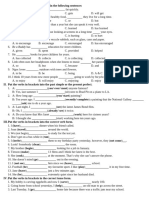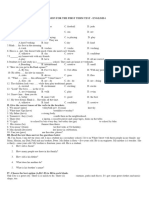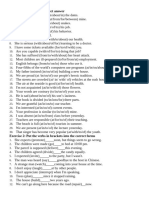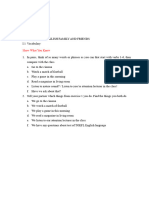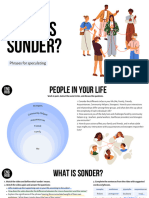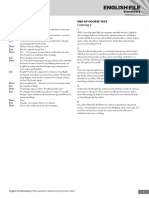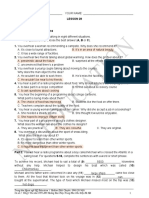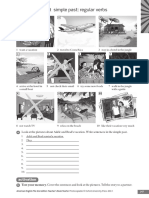0 ratings0% found this document useful (0 votes)
41 viewsIII - Put The Verbs in Brackets Into The Past Simple or The Present Perfect
III - Put The Verbs in Brackets Into The Past Simple or The Present Perfect
Uploaded by
HeavenPot OverThe document describes various volunteer activities that students engage in to help their communities. It provides examples of students in the US who volunteer at hospitals, orphanages, and homes for the elderly by reading to people, visiting them, and playing games. It also discusses volunteers who help sick or elderly people by doing tasks like shopping, cleaning, painting, and repairing houses. Additionally, it mentions an organization called Big Brothers that arranges activities like basketball games and fishing trips to help fatherless boys learn things they would normally learn from their fathers. The document explains that student volunteers are well-suited for working with younger children because they can understand the problems of younger people.
Copyright:
© All Rights Reserved
Available Formats
Download as DOC, PDF, TXT or read online from Scribd
III - Put The Verbs in Brackets Into The Past Simple or The Present Perfect
III - Put The Verbs in Brackets Into The Past Simple or The Present Perfect
Uploaded by
HeavenPot Over0 ratings0% found this document useful (0 votes)
41 views2 pagesThe document describes various volunteer activities that students engage in to help their communities. It provides examples of students in the US who volunteer at hospitals, orphanages, and homes for the elderly by reading to people, visiting them, and playing games. It also discusses volunteers who help sick or elderly people by doing tasks like shopping, cleaning, painting, and repairing houses. Additionally, it mentions an organization called Big Brothers that arranges activities like basketball games and fishing trips to help fatherless boys learn things they would normally learn from their fathers. The document explains that student volunteers are well-suited for working with younger children because they can understand the problems of younger people.
Original Title
BVN U3
Copyright
© © All Rights Reserved
Available Formats
DOC, PDF, TXT or read online from Scribd
Share this document
Did you find this document useful?
Is this content inappropriate?
The document describes various volunteer activities that students engage in to help their communities. It provides examples of students in the US who volunteer at hospitals, orphanages, and homes for the elderly by reading to people, visiting them, and playing games. It also discusses volunteers who help sick or elderly people by doing tasks like shopping, cleaning, painting, and repairing houses. Additionally, it mentions an organization called Big Brothers that arranges activities like basketball games and fishing trips to help fatherless boys learn things they would normally learn from their fathers. The document explains that student volunteers are well-suited for working with younger children because they can understand the problems of younger people.
Copyright:
© All Rights Reserved
Available Formats
Download as DOC, PDF, TXT or read online from Scribd
Download as doc, pdf, or txt
0 ratings0% found this document useful (0 votes)
41 views2 pagesIII - Put The Verbs in Brackets Into The Past Simple or The Present Perfect
III - Put The Verbs in Brackets Into The Past Simple or The Present Perfect
Uploaded by
HeavenPot OverThe document describes various volunteer activities that students engage in to help their communities. It provides examples of students in the US who volunteer at hospitals, orphanages, and homes for the elderly by reading to people, visiting them, and playing games. It also discusses volunteers who help sick or elderly people by doing tasks like shopping, cleaning, painting, and repairing houses. Additionally, it mentions an organization called Big Brothers that arranges activities like basketball games and fishing trips to help fatherless boys learn things they would normally learn from their fathers. The document explains that student volunteers are well-suited for working with younger children because they can understand the problems of younger people.
Copyright:
© All Rights Reserved
Available Formats
Download as DOC, PDF, TXT or read online from Scribd
Download as doc, pdf, or txt
You are on page 1of 2
III.Put the verbs in brackets into the past simple or the present perfect.
1. A: Have you ever met(you/ ever/ meet) anyone famous?
B: Yes, last summer I sat (sit) next to Brad Pit on a plane to LA.
2. A: How long ago did you start (you/ start) painting?
B: Ten years ago. I have recently to complete ( recently/ complete) a painting that the
National Gallery asked (ask) me to do a year ago.
3. A: Last night, I saw (see) the latest James Bond film.
B: Oh, I have have already seen (already/ see) it twice.
4. A: Do you know that Mrs Janet has worked (work) here for sixteen years?
B: I thought she started (start) working here ten years ago.
IV. Put the verbs in brackets into the correct verb form.
1. I (have) was having dinner when his friend called.
2. Joan (travel) has travel around the world.
3. We (not begin) haven’t began to study for the test yet.
4. Don’t get on a bus while it (run) running .
5. I (invite) invited them to my birthday party yesterday, however, they (not come) .
6. Look! Somebody (clean) is cleaning the room.
7. My brother (begin) began looking for a job in January.
8. Timson (make) has make 13 films and I think her latest is the best.
9. She (cook) is cooking at the moment. That’s why she can’t answer the phone.
10. She doesn’t mind (go) going out in the evening.
11. I (not see) haven’t him since we (leave) left school.
12. Football (be) is my favourite sport. I like (play) playing it in my free time.
13. Jane (leave) left just a few minutes ago.
14. She (be) has been extremely quiet since her husband died.
V. Put the verbs in brackets in the correct tense form.
1. My hobby is carving eggshells and now I (carve) have carve nearly 100.
2. Going home from school yesterday, I (help) helped an old man to go across the street.
3. Last Tuesday, I (go) went home late because there was a traffic jam near my school.
4. At Tet, my mother and her close friends often go to the hospitals to donate cakes, sweets
and toys for the sick children there. She (do) have do it for many years.
5. Lan never (eat) has never eat en Banh tet. She will try some this year.
6. Linh is my close friend. We (know) have know each other for 5 years.
7. You ever (do) have do volunteer work?
- Yes. I (do) have does volunteer work last month.
8. I (collect) hundreds of old books and clothes for street children so far.
9. My sister wants to raise funds for street children so she (make) hundreds of
postcards to sell them.
IX. Read the passage, and then choose the best answers.
Each country has many good people who take care of others. For example, some of students
in the United States often spend many hours as volunteers in hospitals, orphanages or homes for
the elderly. They read books to the people in these places, or they just visit them and play games
with them or listen to their problems.
Other young volunteers go and work in the homes of people who are sick or old. They paint,
clean up, or repair their houses, do the shopping. For boys who don’t have fathers, there is an
organization called Big Brothers. College students and other men take these boys to basketball
games or on fishing trips and help them to get to know things those boys usually learn from their
fathers.
Each city has a number of clubs where boys and girls can go and play games. Some of these
clubs show movies or hold short trip to the mountains, the beaches, museums, or other places of
interest. Most of these clubs use a lot of students as volunteers because they are young enough to
understand the problems of younger boys and girls.
1. What do volunteers usually do to help those who are sick or old in their homes?
A. They do the shopping, and repair or clean up their house.
B. They tell them stories and sing dance for them.
C. They cool, sew, and wash their clothes.
D. They take them to basketball games.
2. What do they help boys whose fathers do not live with them?
A. To learn things about their fathers.
B. To get to know thing about their fathers.
C. To get to know things that boys want from their fathers.
D. To learn things that boys usually learn from their fathers.
3 .Which activities are NOT available for the students at the clubs?
A. playing games B. learning photography
C. going to interest places D. watching films
4. Why do they use many students as volunteers? – Because .
A. they can understand the problems of younger boys and girls.
B. they have a lot of free time.
C. they know how to do the work.
D. they are good at playing games and learning new things.
5. Where don’t students often do volunteer work?
A. hospitals B. orphanages C. clubs D. homes for the elderly
You might also like
- Test 1 Unit 3Document4 pagesTest 1 Unit 3trahuongphamleNo ratings yet
- Thì a an some any how much how manyDocument6 pagesThì a an some any how much how manyphamdothuquyen1No ratings yet
- Phiếu học sinh - UNIT 3Document12 pagesPhiếu học sinh - UNIT 3Phạm Ngọc HuyềnNo ratings yet
- Revision For The First Term TestDocument3 pagesRevision For The First Term TestNguyen Thi Thu HienNo ratings yet
- Have Do DoneDocument6 pagesHave Do Donehienhiendang23No ratings yet
- Đề cương ôn thi học kì 1 môn tiếng Anh lớp 5 năm 2022 - 2023Document20 pagesĐề cương ôn thi học kì 1 môn tiếng Anh lớp 5 năm 2022 - 2023lam tranNo ratings yet
- Bài Tập Starter Unit Phần 2Document12 pagesBài Tập Starter Unit Phần 2vy nguyễnNo ratings yet
- Practice 5 Indirect questions and possibilities - Sandoval Montes Rosa DanielaDocument2 pagesPractice 5 Indirect questions and possibilities - Sandoval Montes Rosa Danielarosa.danielaNo ratings yet
- Practice 5 Indirect Questions and Possibilities - Sandoval Montes Rosa DanielaDocument2 pagesPractice 5 Indirect Questions and Possibilities - Sandoval Montes Rosa Danielarosa.danielaNo ratings yet
- Anh 7Document3 pagesAnh 7duyanhdzvvvvvv33No ratings yet
- PronounsDocument13 pagesPronounsKristal Almodovar DandiNo ratings yet
- Exercises Practice Unit 4Document6 pagesExercises Practice Unit 4Trần Thị Hương QuỳnhNo ratings yet
- Bài Gi NG 23Document15 pagesBài Gi NG 23phuongdung.pj06No ratings yet
- B8-ToeicDocument31 pagesB8-ToeicCẩm Tú PhạmNo ratings yet
- Unit 1 - TestDocument4 pagesUnit 1 - Testngocchaurosie155No ratings yet
- 8 - The Second Mid Term Test PreparationDocument8 pages8 - The Second Mid Term Test PreparationAyu Nur Indah SariNo ratings yet
- 7td, HK1, de 4Document5 pages7td, HK1, de 4LongHải Ng.No ratings yet
- Btctal 2Document5 pagesBtctal 2Linh PhúcNo ratings yet
- Name: Visa Ranico Class: PBI of 04 NIM: 1930205117 Lecturer: Hj. Lenny Marzulina, M.PDDocument31 pagesName: Visa Ranico Class: PBI of 04 NIM: 1930205117 Lecturer: Hj. Lenny Marzulina, M.PDVisa RanicoNo ratings yet
- De Cuong Tieng Anh Lop 5 Hoc Ki 1 Nam 2020 2021Document27 pagesDe Cuong Tieng Anh Lop 5 Hoc Ki 1 Nam 2020 2021lam tranNo ratings yet
- Iii. Verbs Exercise 4: Complete The Sentences. Use Separable Word Verbs With TheDocument10 pagesIii. Verbs Exercise 4: Complete The Sentences. Use Separable Word Verbs With TheTenri Awaru DarsamNo ratings yet
- ĐỀ KIỂM TRA CUỐI KỲ I LỚP 7Document8 pagesĐỀ KIỂM TRA CUỐI KỲ I LỚP 7linhcv2004No ratings yet
- kiểm traDocument2 pageskiểm trabangphong2929No ratings yet
- 04-07 Viewpoints2 WB GrammarReviewDocument4 pages04-07 Viewpoints2 WB GrammarReviewEncarna MariaNo ratings yet
- Unit 3 - Practice Test No. 4Document3 pagesUnit 3 - Practice Test No. 4nguyen ngaNo ratings yet
- PDFDocument20 pagesPDFJosé castillo100% (1)
- Workshop IiDocument13 pagesWorkshop IiLi CastilloNo ratings yet
- Ainhoa Ruiz English NotebookDocument10 pagesAinhoa Ruiz English NotebookNoa xNo ratings yet
- Tiếng Anh 5 Học Kì 1 Đề Cương Ôn TậpDocument11 pagesTiếng Anh 5 Học Kì 1 Đề Cương Ôn TậpLiên Nga Nguyễn ThịNo ratings yet
- BT Tuan 13 k9Document4 pagesBT Tuan 13 k9Rubi AnhNo ratings yet
- Thiên Hương -Đề Cương Anh 8 Cuối Học Kì 1 2022-2023Document19 pagesThiên Hương -Đề Cương Anh 8 Cuối Học Kì 1 2022-2023Tô NgânNo ratings yet
- Ha 5Document7 pagesHa 5ngoc04667No ratings yet
- Контрольна ІІ Сем 9 КлDocument5 pagesКонтрольна ІІ Сем 9 КлAlyona TimchenkoNo ratings yet
- ôn tập thìDocument3 pagesôn tập thìNgọc NgọcNo ratings yet
- 2 - Soal - Kelas 10 - Uji Modul 1 Bahasa InggrisDocument11 pages2 - Soal - Kelas 10 - Uji Modul 1 Bahasa InggrisDewi oktavianiNo ratings yet
- Midterm 2Document5 pagesMidterm 2Phan Lê Cẩm TràNo ratings yet
- MOCK TEST 10.12 I.Use of English (2Ms) : B. Read The Passage Below and Choose One Correct Answer For Each QuestionDocument2 pagesMOCK TEST 10.12 I.Use of English (2Ms) : B. Read The Passage Below and Choose One Correct Answer For Each QuestionTrần Nguyễn Quỳnh NhưNo ratings yet
- المراجعة الكافية الوافية، 2 متوسطة، 24 25، المقطع الـ1، نسخة 2،Document25 pagesالمراجعة الكافية الوافية، 2 متوسطة، 24 25، المقطع الـ1، نسخة 2،debechemalak402No ratings yet
- المراجعة الكافية الوافية، 2 متوسطة، 24 25، المقطع الـ1، نسخة 2،Document25 pagesالمراجعة الكافية الوافية، 2 متوسطة، 24 25، المقطع الـ1، نسخة 2،Rafife NounaNo ratings yet
- Review 6Document22 pagesReview 6Nhien AnNo ratings yet
- Mid Test 3 Hoa BinhDocument7 pagesMid Test 3 Hoa BinhChinh NguyenNo ratings yet
- This Is My Class: Middle TestDocument7 pagesThis Is My Class: Middle Testmahbub_kokoNo ratings yet
- Class 6 Grammar Chapter 6 PronounsDocument5 pagesClass 6 Grammar Chapter 6 PronounsTanmoy ChowdhuryNo ratings yet
- Thể loại từ - Viết lại câuDocument10 pagesThể loại từ - Viết lại câu211gth013naNo ratings yet
- Task Weekdays Day 1 - M. Irfan MardhaniDocument5 pagesTask Weekdays Day 1 - M. Irfan Mardhanifarreldafasatria28No ratings yet
- Answer Bai TestDocument3 pagesAnswer Bai TestTrần Văn Chế ThanhNo ratings yet
- Week 12Document12 pagesWeek 12Phương Thanh LêNo ratings yet
- Mid Semester 1 KeyDocument4 pagesMid Semester 1 KeyHuy Trần Nguyễn HoàngNo ratings yet
- De 2 Tieng Anh 7Document5 pagesDe 2 Tieng Anh 7Thảo LêNo ratings yet
- Bai Tap Tieng Anh 11 Mai Lan Huong Đã Chuyển ĐổiDocument211 pagesBai Tap Tieng Anh 11 Mai Lan Huong Đã Chuyển ĐổiMilky's House - Dog LoversNo ratings yet
- Đề thi tiếng Anh lớp 7 giữa kì 1Document8 pagesĐề thi tiếng Anh lớp 7 giữa kì 1nhihtNo ratings yet
- 2022 01 Test CJExABDocument3 pages2022 01 Test CJExABraiu Daniel ConstantinNo ratings yet
- ĐỀ THI HSG SỐ 3 L7Document7 pagesĐỀ THI HSG SỐ 3 L7Lương NguyễnNo ratings yet
- English 3 Abdias GavillaDocument17 pagesEnglish 3 Abdias GavillaMaximino GarciaNo ratings yet
- Đề Ôn Thi Toefl Primary Theo Form Mới Nhất Iig Ban Hành (2022)Document19 pagesĐề Ôn Thi Toefl Primary Theo Form Mới Nhất Iig Ban Hành (2022)linhleNo ratings yet
- Bai Tap Tieng Anh 7 Global Success Unit 1 2 3Document4 pagesBai Tap Tieng Anh 7 Global Success Unit 1 2 3echs.2030% (1)
- Ket 1 Test 1Document65 pagesKet 1 Test 1sunrisenguyen0305No ratings yet
- Advice About Work and Play: Claudia Cristina Cortez Uncomplicates Your LifeFrom EverandAdvice About Work and Play: Claudia Cristina Cortez Uncomplicates Your LifeNo ratings yet
- C1 What Is Sonder (Phrases For Speculating) SVDocument26 pagesC1 What Is Sonder (Phrases For Speculating) SVNastya & Pasha HorseblogNo ratings yet
- Test 1: Paper 1 READING (1 Hour) 1-8, Choose The Answer (A, B, C or D) Which You Think Fits Best According To The TextDocument15 pagesTest 1: Paper 1 READING (1 Hour) 1-8, Choose The Answer (A, B, C or D) Which You Think Fits Best According To The TextHa Anh NguyenNo ratings yet
- Third Conditional ExercisesDocument1 pageThird Conditional ExercisesDarwin Db'100% (1)
- The Ungrateful Child: How Sharper Than A Serpent's Tooth It Is To Have A Thankless Child!Document2 pagesThe Ungrateful Child: How Sharper Than A Serpent's Tooth It Is To Have A Thankless Child!Blue BlueNo ratings yet
- Core Rulebook 5eDocument25 pagesCore Rulebook 5etebabep929No ratings yet
- Sample Cover Letter For Tourist Visa ApplicationDocument8 pagesSample Cover Letter For Tourist Visa Applicationqrsirljbf100% (2)
- The Advanture BeginsDocument3 pagesThe Advanture BeginsIndry SaraNo ratings yet
- Print Apr InsectophobeDocument272 pagesPrint Apr Insectophobekass90% (10)
- Do You Need A VisaDocument3 pagesDo You Need A VisaFaith OluwaleNo ratings yet
- Flight DetailsDocument1 pageFlight DetailsYoli AldanaNo ratings yet
- Lmed Uas PDFDocument7 pagesLmed Uas PDFRiza DwiNo ratings yet
- A. The Meaning of SecretsDocument3 pagesA. The Meaning of SecretsSebastiana DianaNo ratings yet
- Test SlideDocument15 pagesTest SlideLeo BalaZonNo ratings yet
- Nonimmigrant Visa - Passport InformationDocument1 pageNonimmigrant Visa - Passport Informationteodora2No ratings yet
- Altaf Shaikh-CompDocument3 pagesAltaf Shaikh-CompMUHAMMAD HAIBNo ratings yet
- Example: This Year, Jen Will Read War and Peace. It Will Be Hard, But She's Determined To Do ItDocument15 pagesExample: This Year, Jen Will Read War and Peace. It Will Be Hard, But She's Determined To Do Itrevi asihNo ratings yet
- HomeworkDocument3 pagesHomeworkAlbot MihaelaNo ratings yet
- EF3e Elem End of Course Listening ScriptsDocument1 pageEF3e Elem End of Course Listening ScriptsLígia LimaNo ratings yet
- Instant Download Predictably Irrational Revised and Expanded Edition Dan Ariely PDF All ChaptersDocument24 pagesInstant Download Predictably Irrational Revised and Expanded Edition Dan Ariely PDF All Chapterseysuspuxi100% (2)
- ADocument2 pagesARaheem WilliamsNo ratings yet
- Synthese: Mardi 25 JanvierDocument4 pagesSynthese: Mardi 25 JanvierLizi LiziNo ratings yet
- Cambridge Primary Checkpoint: Cambridge Assessment International EducationDocument8 pagesCambridge Primary Checkpoint: Cambridge Assessment International EducationVaidika GoldieNo ratings yet
- Gulliver's Travel (To Vex The World)Document3 pagesGulliver's Travel (To Vex The World)Noor UlainNo ratings yet
- The Three Investigators (111) : The Secret of The Cave of TortureDocument70 pagesThe Three Investigators (111) : The Secret of The Cave of TortureLiz Patterson100% (1)
- 7A L29 Phiếu BTDocument6 pages7A L29 Phiếu BTAn Tran MinhNo ratings yet
- Grammar File10Document2 pagesGrammar File10Carlos DelgadoNo ratings yet
- Full download The GR11 Trail Through the Spanish Pyrenees 6th Edition Brian Johnson pdf docxDocument52 pagesFull download The GR11 Trail Through the Spanish Pyrenees 6th Edition Brian Johnson pdf docxiracebeyx100% (1)
- Spark 2 INT Pairwork 6Document2 pagesSpark 2 INT Pairwork 6Lingva Lingva BinestNo ratings yet
- Secret of NagasDocument2 pagesSecret of NagasElakkiya RaviNo ratings yet
- Journey of ReflectionDocument1 pageJourney of ReflectionBush B ThomasNo ratings yet

